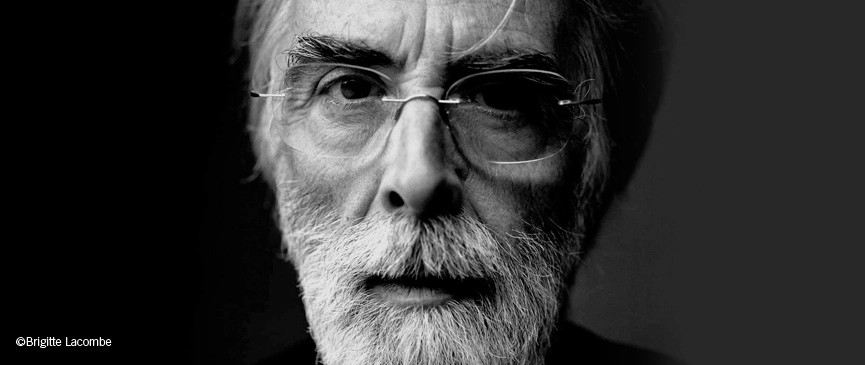Main content
Michael Haneke Prince of Asturias Award for the Arts 2013

Considered "the poet of the cinema of discomfort", Michael Haneke (Munich, Germany, 1942) studied Philosophy, Psychology and Theatre at the University of Vienna. His penetrating, radical gaze on society has allowed him to explore uncharted terrain to become one of the leading auteurs of contemporary European cinema. He worked as a screenwriter for Südwestfunk (Southwest Germany's public broadcasting corporation) between 1967 and 1970, since which he has worked as an independent director and screenwriter. As a playwright, he has directed stage productions in Germany and Vienna of plays by Strindberg and Goethe, as well as operas. He made his television debut in 1974 with After Liverpool, following which he directed another seven films for German television, including an adaptation of Kafka's The Castle.
His debut film was The Seventh Continent (1989), a stark analysis of the self-destruction of a middle-class Viennese family. This was the first in what Haneke conceived as a "trilogy of emotional glaciation", completed by Benny's Video (1992) and 71 Fragments of a Chronology of Chance (1994). In his relentless, personal exposure of reality, Haneke portrays situations of violence, sex and repression, often the result of isolation and the characters' lack of communication as individuals or as a group. The angst that this experience creates in the viewer is a resource that Haneke exploits to stimulate reflection about the structures and principles underlying modern society, including cinema itself. He achieved international fame in 1997 with Funny Games, a macabre game of horror and humiliation. The film's success spawned a US remake, which Haneke himself directed some years later. It is precisely in the representation of generally unjustified violence, which is suggested more than manifest, and in his unconventional narrative and visual structures where the Austrian filmmaker reveals his talent as an innovator. In 2000, he shot Code Unknown. The following year, The Pianist, based on the novel by Nobel Prize Winner for Literature Elfriede Jelinek, won the Grand Prix at the Cannes Film Festival.
Haneke once again received critical acclaim with Hidden (2005), in which he narrates the ravages caused in a couple as a consequence of the appearance of videos of their daily lives filmed without their knowledge. For this film, he received the awards for Best Director at Cannes and Best Film and Best Director at the 2005 European Film Awards, among others. The White Ribbon (2009) is a black and white portrait of a rural community dominated by hypocrisy, moral rigidity and authoritarian education. Internationally acclaimed, it won the Palme D'Or at Cannes, as well as the awards for Best Film, Best Screenplay and Best Director at the European Film Awards and the Golden Globe Awards. With his latest film, Love (2012), a portrait of true, unconditional love and of the desolation and despair of physical deterioration in old age, Haneke once again won the Palme D'Or at Cannes and another Golden Globe Award, as well as the Oscar for Best Foreign Language Film.
In addition to these distinctions, Michael Haneke holds numerous other international film awards and, in 2007, was awarded the Austrian Cross of Honour for Arts and Sciences. In 2013, he received the Gold Medal from Madrid's Círculo de Bellas Artes, coinciding with the premiere of his staging of Così fan tutte at the Teatro Real.
End of main content
